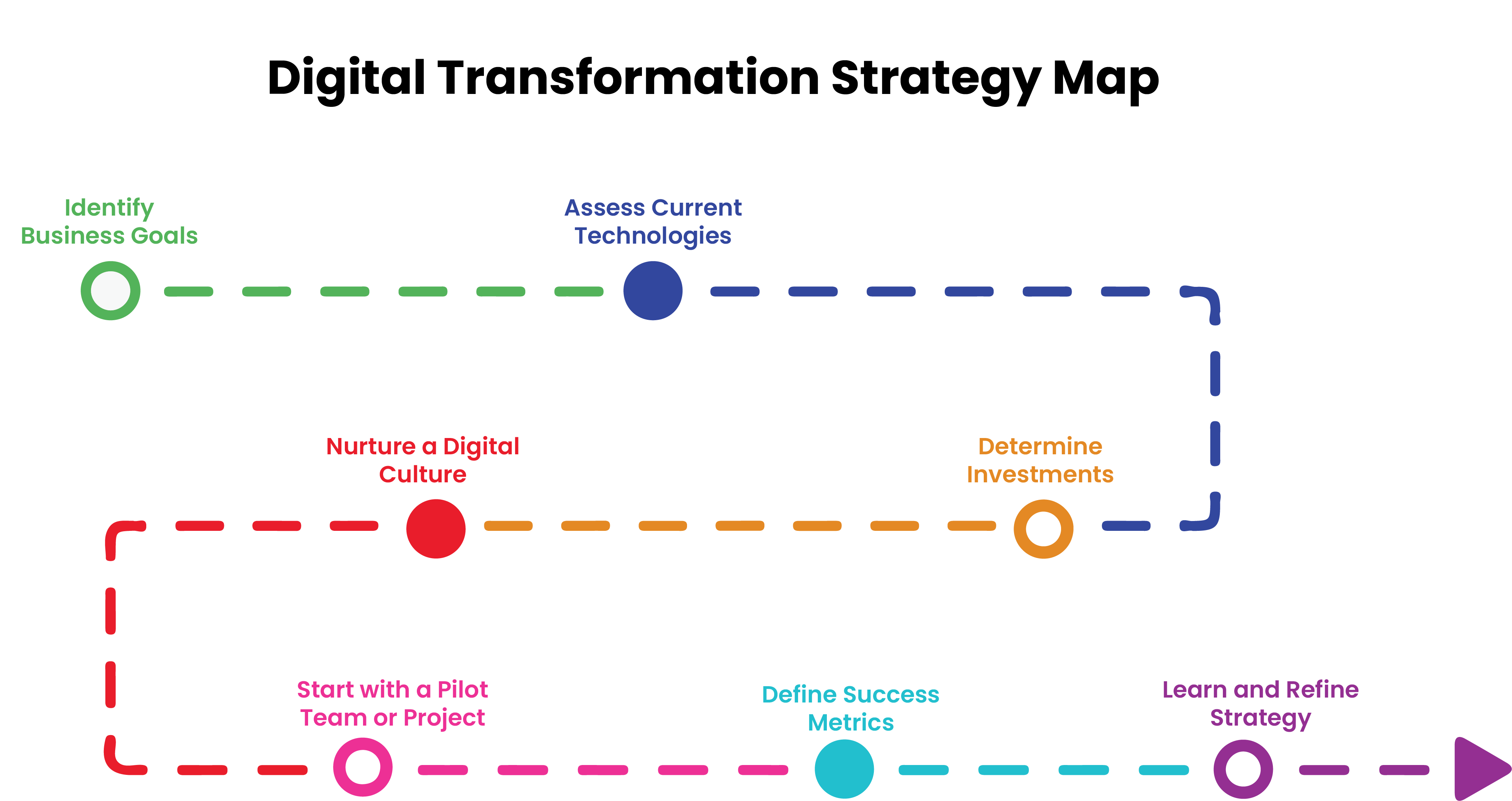Digital Transformation
HYPERGRID Technology Solutions Digital Transformation Services focus on enabling organizations to leverage digital technologies to improve operational efficiency, enhance customer experiences, and drive business innovation. These services typically cover a range of consulting, development, and support offerings that guide businesses through the adoption and integration of digital solutions tailored to their goals. Here’s an overview of common Digital Transformation Services:

1. Digital Strategy and Consulting
-
Technology Assessment: Evaluate current technology infrastructure and business processes to identify opportunities for digitalization.
-
Digital Roadmap Development: Create a roadmap aligned with business goals to outline the digital transformation journey.
-
Business Process Optimization: Analyze and redesign processes for improved efficiency, often leveraging automation and data analytics.
2. Cloud Transformation
-
Cloud Strategy Development: Plan a cloud adoption strategy based on business needs and compliance requirements.
-
Cloud Migration Services: Assist in moving applications, data, and infrastructure from on-premises to cloud environments (AWS, Azure, Google Cloud).
-
Cloud-Native Development: Build or re-architect applications specifically for the cloud, enhancing scalability and resilience.
3. Data and Analytics
-
Data Strategy and Governance: Define data governance policies and strategies for data management.
-
Big Data and Analytics: Implement big data solutions to analyze large volumes of data for actionable insights.
-
Business Intelligence (BI) and Reporting: Enable real-time data reporting and visualization through BI tools to support data-driven decision-making.
4. Artificial Intelligence (AI) and Machine Learning (ML)
-
AI Strategy: Identify use cases for AI within the organization and create a plan for AI adoption.
-
Machine Learning Model Development: Develop, train, and deploy machine learning models for predictive analytics, customer segmentation, recommendation engines, and more
-
Natural Language Processing (NLP): Implement NLP applications, like chatbots or sentiment analysis, to enhance customer experience and automate interactions.
5. Automation and RPA (Robotic Process Automation)
-
Process Automation Assessment: Identify repetitive tasks that can be automated to reduce manual effort and improve efficiency.
-
RPA Implementation: Develop bots to automate routine processes, improving accuracy and saving time.
-
Intelligent Automation: Combine RPA with AI/ML to enable more complex, decision-based automation.
6. Customer Experience (CX) Transformation
-
Digital Experience Platforms (DXP): Develop and integrate DXP solutions to deliver seamless digital experiences across customer touchpoints.
-
Omnichannel Experience: Create a unified customer experience across digital channels (web, mobile, social media) for consistent interactions.
-
Personalization and Customer Insights: Use analytics and AI to deliver personalized customer experiences and understand customer behavior.
7. Cybersecurity Transformation
-
Security Assessment and Strategy: Conduct security audits and develop a cybersecurity strategy tailored to digital transformation goals.
-
Risk Management and Compliance: Ensure adherence to industry regulations and standards like GDPR, HIPAA, and ISO.
-
Advanced Security Solutions: Implement solutions like threat detection, multi-factor authentication, and endpoint security to protect digital assets.
8. Workplace Transformation
-
Collaboration Tools: Implement collaboration platforms (e.g., Microsoft Teams, Slack) to enhance communication within the workforce.
-
Remote Work Solutions: Develop secure and efficient remote work environments with cloud-based tools and virtual desktop solutions.
-
Employee Experience Optimization: Focus on digital solutions that streamline workflows, onboarding, and engagement to improve the employee experience.
9. Internet of Things (IoT) Solutions
-
IoT Strategy and Consulting: Develop an IoT strategy to identify relevant use cases and necessary infrastructure.
-
IoT Platform Implementation: Deploy IoT platforms to manage connected devices and gather real-time data.
-
Predictive Maintenance: Use IoT data to enable predictive maintenance in manufacturing, logistics, and other sectors.
10. Change Management and Training
-
Change Management Strategy: Develop change management plans to support employees through the digital transformation process.
-
Training Programs: Provide training on new technologies and tools to empower employees and ease the adoption of new systems.
-
User Support: Offer ongoing user support and resources to maintain high engagement and productivity during transformation.
Benefits of Digital Transformation Services:
-
Improved Operational Efficiency: Automation and data-driven insights reduce manual work and streamline operations.
-
Enhanced Customer Experience: Personalization and seamless multi-channel experiences improve customer satisfaction.
-
Innovation and Competitive Advantage: Adoption of advanced technologies like AI and IoT can drive innovation and differentiate a business.
-
Scalability and Flexibility: Cloud and digital solutions allow organizations to scale operations quickly as needed.
Digital Transformation Services are typically tailored to the specific needs of an organization, focusing on sustainable adoption and value realization across all aspects of the business.

